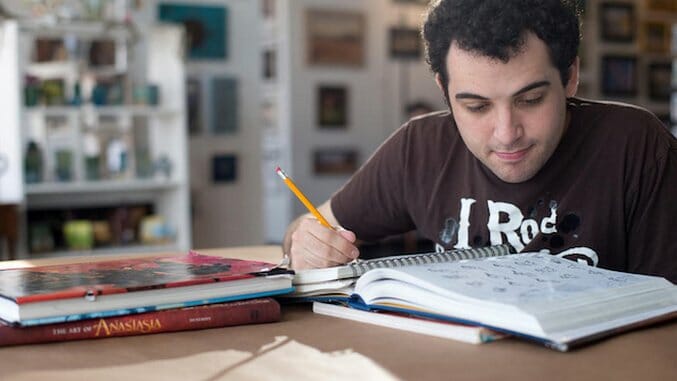
In some ways, it’s rather unfortunate that Disney movies are what led Owen Suskind, the autistic 23-year-old at the heart of Roger Ross Williams’ documentary Life, Animated, to become better at relating to the world around him despite his disorder. Those who are turned off by Walt Disney Pictures’ flattening of human experience into a sentimental kid-friendly formula may well find the spectacle of seeing a mentally disabled kid become a more functional adult through memorizing every single animated Disney picture unsettling, if not outright galling. Not even the recent Disney-produced biopic Saving Mr. Banks could have come up with a better way to sell the life-changing potential of the corporate brand.
Perhaps it’s best, then, to ignore the fact that Disney movies are the target of Owen’s obsessions and look at Life, Animated on a more abstract level: as the inspirational coming-of-age story of a mentally disabled person essentially rescued by art. When Owen is seen in bed in his new apartment watching Bambi call out for her mother after she’s fatally shot in Bambi, he’s doing something surely all of us are inclined to do: therapeutically use art to process real-world emotions—in Owen’s case, the anxiety of living away from his parents for the first time. It’s just that here that work of art happens to be a Walt Disney animated production.
Besides, Life, Animated isn’t entirely adulatory toward the Disney brand. A bit of complexity seeps through, especially in the film’s last half hour, once Owen moves into that new apartment, away from the parents who have supported him all his life. It is then he begins to feel the messier emotions dredged up by such mature traumas as romantic heartbreak—experiences that Disney films, with their happily-ever-after endings, don’t always address. Walter, Owen’s brother, is most explicit about his desire to teach his brother about life beyond the realm of Disney animation; he struggles in particular with how to talk to Owen about sex, because that’s just something Disney’s family-friendly entertainment never covers as a rule. But it’s Owen himself who most poignantly gives vent to the limits of Disney films in speaking to lived experience when he frustratedly asks his mother over the phone, “Why is life so full of unfair pain and tragedy?”
For his part, director Williams brings to Life, Animated an aesthetic that tries, to some degree, to get inside Owen’s head rather than merely observing him. Most notably, Williams uses Mac Guff’s hand-drawn animation to illustrate certain childhood memories as well as bring “The Land of the Lost Sidekicks”—Owen’s own adventure story in which he imagines himself as the “Protector of Sidekicks,” in charge of shielding popular Disney second-bananas like The Little Mermaid’s Sebastian and The Lion King’s Mufasa—to vibrantly colorful life. On the one hand, the animation could be seen as Williams’ concession to Disney-style schmaltz; on the other, considering Owen’s Disney-fed upbringing, it could also be interpreted as an expressionistic illustration of his own perspective. Even “The Land of the Lost Sidekicks” is transformed the deeper Owen dives into adult life: He goes so far as to create a wholly original villain character named Fuzzbutch as a way of coping with the pain of recent experiences. Not only have Disney movies helped him successfully deal with the social effects of his autism, they have inspired him to become something of an artist as well. Life, Animated may ultimately end on an optimistic note, but unlike most Disney movies, Williams at least leaves us with the lingering sense that Owen, as astonishing as his progress in dealing with his autism has been, still has a lot of growing up to do.
Director: Roger Ross Williams
Writer: Ron Suskind, based on his book
Starring: Owen Suskind, Ron Suskind, Cornelia Suskind, Walter Suskind
Release Date: July 1, 2016
Kenji Fujishima is a freelance film critic, contributing to Slant Magazine, Brooklyn Magazine, The Playlist, and the Village Voice in addition to Paste. He is also Deputy Editor of Movie Mezzanine and former editor-in-chief of In Review Online. When he’s not watching movies and writing and editing film criticism, he’s trying to absorb as much music, art and literature as possible. He has not infrequently been called a “culture vulture” for that reason.